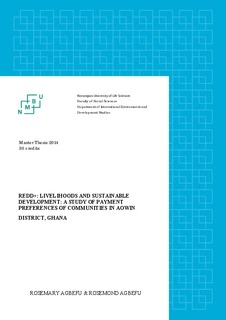| dc.contributor.author | Agbefu, Rosemond | |
| dc.contributor.author | Agbefu, Rosemary | |
| dc.date.accessioned | 2015-07-27T09:24:22Z | |
| dc.date.available | 2015-07-27T09:24:22Z | |
| dc.date.copyright | 2014 | |
| dc.date.issued | 2015-07-27 | |
| dc.identifier.uri | http://hdl.handle.net/11250/293626 | |
| dc.description.abstract | The study is an assessment of the livelihood and sustainable development impacts associated with REDD+ and its compensation program in the Aowin district of Ghana. Through the use of focus group discussions, we try to understand community preferences with regards to compensation for avoided deforestation and engaging in other mitigation activities. The study was carried out in six selected forest communities in the Aowin district. The theoretical framework and concepts that were employed in this study are: the Sustainable Livelihood Framework (SLF), Benefit Sharing, Institutions and the concept of Sustainable Development. SLF is used to describe the relationship between people’s assets, their vulnerabilities, and processes and structures that exist to transform their assets into meaningful livelihoods. Using the concepts of Benefit sharing and Institutions respectively, we explore what benefit sharing mechanisms and institutional structures exist in the communities to ensure the implementation of REDD+ agenda, and a fair and equitable distribution of compensation. Sustainable development as a concept is used in an attempt to understand people´s perceptions of sustainability in relation to REDD+ and forest management. Our findings revealed sharp differences in type of compensation that in-migrant farmers and indigenous famers prefer- indigenous farmers preferred in-kind payments, while migrant farmers preferred in-cash.
We also identified a complex legal pluralistic land tenure and unfavourable benefit sharing systems as practical challenges that could affect the implementation of the REDD+ agenda in the district.
In general, people lacked knowledge on REDD+ and related issues. However, a majority of respondents showed enthusiasm about the prospects of REDD+ in their communities | nb_NO |
| dc.language.iso | eng | nb_NO |
| dc.publisher | Norwegian University of Life Sciences, Ås | |
| dc.rights | Navngivelse-IngenBearbeidelse 3.0 Norge | * |
| dc.rights.uri | http://creativecommons.org/licenses/by-nd/3.0/no/ | * |
| dc.title | REDD+, livelihoods and sustainable development : a study of payment preferences of communities in Aowin District, Ghana | nb_NO |
| dc.type | Master thesis | nb_NO |
| dc.subject.nsi | VDP::Social science: 200 | nb_NO |
| dc.source.pagenumber | 162 | nb_NO |
| dc.description.localcode | M-DS | nb_NO |

